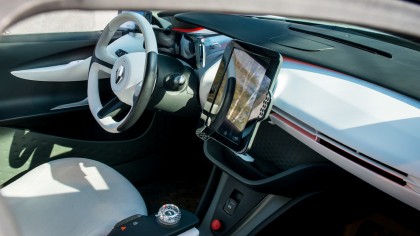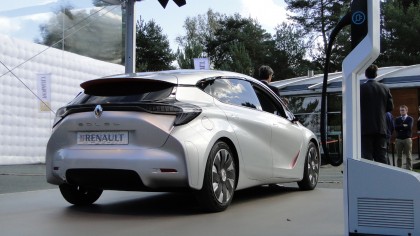Driving Renault's incredible 282mpg Eolab
The future of motoring or temporary tax dodge on four wheels?
Sign up for breaking news, reviews, opinion, top tech deals, and more.
You are now subscribed
Your newsletter sign-up was successful
Behind the wheel
If that's the overview, what's the Eolab actually like to sit in and drive? It's actually pretty well finished for a prototype. But the overwhelming feeling you get lightness, lightness, lightness, both for good and bad.
The only bad element is a lack of substance to some elements of the car – the trim, the interior door panels, that kind of thing. It's inevitable in the context of extreme weight saving, but it's an interesting problem in terms of consumer tolerance. Will people put up with lower levels of perceived quality in return for efficiency?

The good bit about the lightness is that this eco-car on its super-skinny tyres feels remarkably dynamic. It's no rocket ship, but it feels responsive and agile – even fun. The transmission is a little clunky on this prototype and the transitions between petrol and electric power can be clumsy. But that's the kind of thing that would almost certainly be solved for series production.
In other words, the Eolab delivers its astonishing 282mpg (and 22g/km of CO2, while it's at it) with little to no compromise on dynamism and performance compared to today's conventional hatchbacks. It's a remarkable achievement.
What's the catch?
And yet there's is a pretty major proviso that hangs over this kind of car. Those remarkable efficiency numbers do not reflect the true energy usage of the Eolab. Instead, they're a product of how the EU measures plug-in hybrid vehicles.
In effect, the energy you put into the Eolab by charging the battery isn't factored into the energy consumption. You get it for free. If you charged it with a bunch of solar panels, then that makes perfect sense.
But if you charge it via the UK's electricity grid, then there are CO2 emissions that are being flatly ignored. This matters because the simple fact is that the added weight of the hybrid bits that make the Eolab so efficient on paper will actually make it less efficient in terms of actual energy use. Fine if the electric energy used is renewable. Total contrary to the professed aims of cars like this if it comes from fossil-fuelled power stations.
Sign up for breaking news, reviews, opinion, top tech deals, and more.

Intriguingly, Renault says the an Eolab fitted simply with a small petrol engine would be good for about 80mpg. An equivalent Clio clocks in around 55mpg.
Critically, none of this is Renault's fault. All Renault can do is build the best car for a given set of regulations and in that context the Eolab is a fantastic bit of technology and brilliantly executed, to boot. It absolutely nails its design brief – to prove Renault's cutting-edge credentials.
But it's also a product of some increasingly bonkers EU regulations, regulations that will probably have to change. And if they do, plug-ins like this will be left looking like the expired tax dodges they ultimately are.
Technology and cars. Increasingly the twain shall meet. Which is handy, because Jeremy (Twitter) is addicted to both. Long-time tech journalist, former editor of iCar magazine and incumbent car guru for T3 magazine, Jeremy reckons in-car technology is about to go thermonuclear. No, not exploding cars. That would be silly. And dangerous. But rather an explosive period of unprecedented innovation. Enjoy the ride.